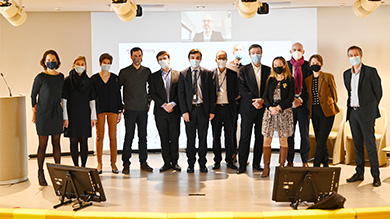Investors have a crucial role to play in developing responsible investment, as according to Natixis Investment Managers’ 2021 Investor Insights Report, 70% of investors worldwide want to make a positive impact with their investments. Engagement with corporates on these themes – across both equity and bond investments – is a major driver for responsible practices, but just how can we successfully develop engagement and galvanize this virtuous trend? Find out more from Nathalie Pistre, Head of Research and SRI at Ostrum Asset Management, and Laure Delahousse, Deputy CEO of the French Asset Management Association (Association Française de la Gestion Financière) in our latest episode of the Green Momentum series.
NATHALIE
PISTRE
Head of Research and SRI at Ostrum Asset Management
LAURE
DELAHOUSSE
Deputy CEO of the French Asset Management Association (AFG)
Varying scope for investor influence between equity and bond investment
Investors are shareholders and as such they hold a stake in a company’s capital, with scope to vote on certain strategies or resolutions at shareholder meetings.
Meanwhile asset managers in their capacity as debt-holders – investing on the bond markets – have a different kind of role to play in spurring companies on to make responsible decisions. Yet while this influence may be different, it remains powerful given today’s soaring debt worldwide.
Varying degrees of engagement, from dialogue to exclusion policies
Against this backdrop, how can companies be encouraged to adopt a stronger focus on sustainable development in their strategies?
The crucial challenge is to develop regular dialogue with these companies and hold them to the highest standards in terms of CSR policies and the way in which they incorporate the energy transition into their business model, with the overarching goal of steering their practices to foster a sustainable economy.
However, if dialogue is unsuccessful on themes that investors hold dear, asset managers may decide to sell positions from their portfolios either with immediate effect when companies fail to take appropriate or timely action, or after a certain period of time during which companies are asked to disclose how they will meet their pledges on the energy and climate transition, biodiversity, etc.
“Here at Ostrum Asset Management, we have asked the companies in question to disclose in 2021 a phased and credible strategy to exit the coal industry by 2030. Corporations that fail to do so, or that provide insufficiently robust plans, will be excluded from our portfolios from 2022 onwards” explains Nathalie Pistre.
Industry bodies led by asset management professionals such as the AFG (Association Française de la Gestion Financière or French Asset Management Association) spearhead the industry’s consideration of these themes and work consistently with regulators to develop sector practices.
Shaping corporate strategies and driving a virtuous circle
However, companies need time to adapt: some have already made strong progress on their CSR pledges, while others are not so far along this path due to their business sector or business growth model. Transition is a long-lasting process, and it is crucial to strike the right balance, combining long-term engagement with real and quantifiable efforts, along with reporting data.
Data are therefore key, with companies increasingly disclosing metrics, whether by conviction or regulatory necessity. This information is crucial for asset managers as they incorporate non-financial data to round out their own assessment of each company’s sustainability. Meanwhile, transparent and stringent disclosure on so-called green products – such as green, social and sustainable bonds and so-called impact funds – is required to develop insight among both institutional and retail investors.
Worldwide support for sustainable development
Positive changes are already under way in Europe, and this momentum is gathering pace worldwide, with affirmative action such as the United States recently rejoining the Paris Agreement and China considering an exit from the coal industry by 2040. This upbeat movement is fueled by ambitious policies from both corporates and asset managers, and bolstered by public opinion – and therefore savers – as well as state support.
Glossary
Bond investment: bond issues are used to fund states, banks, corporates and government organizations. The borrower issues bonds, which are bought by investors who receive interest on a periodic basis, while invested capital is subsequently returned to them at a preset date.
CSR: corporate social responsibility is defined by the European Commission as “a concept whereby companies integrate social and environmental concerns in their business operations and in their interaction with their stakeholders on a voluntary basis”. It denotes companies’ contribution to sustainable development issues.
Shareholder engagement: shareholder engagement refers to investors’ commitment to taking a stance on ESG challenges (environmental, social and governance) and calling on companies to enhance their practices over the long term with a view to shaping their strategies. This involves an organized approach comprising direct dialogue with the company and monitoring of progress in the long term.
The analyses and opinions referenced herein represent the subjective views of the author(s) as referenced, are as of the date shown and are subject to change without prior notice. There can be no assurance that developments will transpire as may be forecasted in this material.
For further information concerning Ostrum AM’s exclusion approach, get more insights on Ostrum AM website suivant : www.ostrum.com/fr.
















